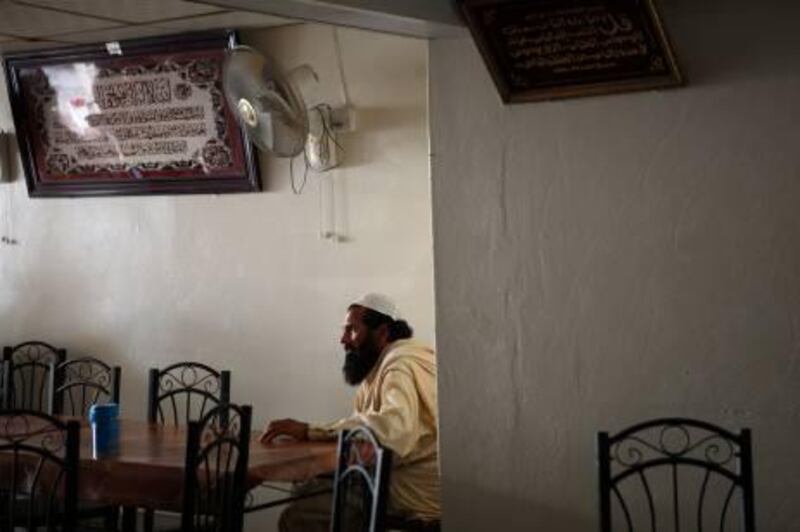ABU DHABI //White Sands Restaurant is named after the only thing that surrounds it. For hundreds of kilometres, there is nothing else.
It is an unlikely oasis on the E65, although on any other road the cafe would not merit a second glance. Its sign is a faded white, its contents hidden by sun-bleached posters of the sheikhs that plaster the windows.
Few would guess the sanctuary found through its doors. No ordinary lorry stop, this is a haven from the elements and loneliness, a place to pray, a place to dine, wash and refuel the mind, body and spirit.
They are basic joys. But men who live in the Empty Quarter know these joys are not to be taken for granted, as do the owners of White Sands.
"If we like for ourselves a thing, we must like it for another," says Barkat Ali Khan, who manages the restaurant with two friends. "Why not provide for the people as they do for us?"
The restaurant on the Abu Dhabi-Al Ain truck road opened in 1978, but since Mr Khan took over management in 2009 sales have leapt ten-fold. Any profit goes back to the labourers and lorry drivers who dine here.
"This is a desert but we are providing everything cheaper, because they are also labour and the same as us," Mr Khan says. "We try our best to provide this service to the people. We try our best because nothing is here."
At the shop, household essentials are sold at cost: dress shoes, flip flops and trainers for Dh10, collared shirts, jerseys, jackets and towels for Dh15, baseball caps and laundry detergent for Dh3.
On Fridays the restaurant is mobbed as workers arrive by the busload, most travelling back from Abu Dhabi to the labour camps. Men pour off the bus and throng the restaurant, dressed in their Friday best of pressed shirts, cologne, slick hair and sweat.
They push into the cafe and place their lips to the jugs of water on tables, quenching their thirst without pausing to pour it into a glass. Others crowd around the kitchen window to choose between Indian, Bangladeshi, Pakistani and Arabic food at Dh6 a parcel.
Fifteen minutes later they are back on the bus and the restaurant is left to bedu farmers and roadtripping families.
Mohammad Sadiq, another manager, reigns over the chaos in his sunglasses, giving the thumbs up to his good friends. Today Mr Sadiq is engaged in a game of football with Savar Shirbate, 9. The boy is on a family road trip from the luxury of Qasr al Sarab. His mother, Projakta, needed a break from the "boring and lonely" landscape.
The nourishment is provided by a crew of 16 men who do the cooking, frying onions in gargantuan cauldrons in the kitchen. As curries boil, Mohammed Yunis, 28, slaps dough on the clay of underground ovens to make his speciality, Afghan nan. It is a job he has done since he was 10. He is grateful for this desert posting, where wages are competitive to compensate for a hard life.
During Ramadan he bakes for 70 people. All are welcome for a free meal, Muslim or not. Although the restaurant is closed in the day, non-Muslims are welcome to grab an early takeaway to sustain them.
"If the heart is big and open, no way it goes down," Mr Khan says. "This we believe."
In the evenings men come to watch the news. It was the only venue in the area that showed the Cricket World Cup. "We want people to know about their country and what is going on," Mr Khan says. "Because there are people who live in the desert and after 10 years they go to the city. This is difficult so we try to help them to keep up."
Gul Khan, 60, from Khyber, worked as a gardener in Al Ain for 21 years before he was transferred to the E65. Now he waters trees at the side of the motorway, waiting for them to grow. He lives alone in a house beside the road.
He comes at night, nursing his tea for two or three hours.
"I was happy in Al Ain in the city," he says. "Here I'm always alone. If this restaurant was not here I would die in the desert."
His home, he says, is "only sand". But at the cafe, his world grows larger through news and Bollywood films. "I like to hear the songs, the dance, the drama. All workers join me on Friday. They come from the camps, so we talk. It is our place for enjoyment.
"I like this place."
[ azacharias@thenational.ae ]






